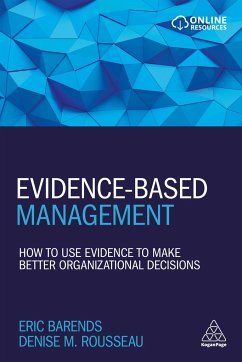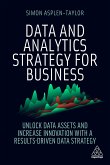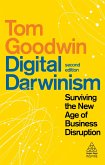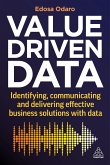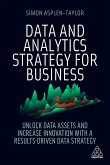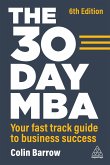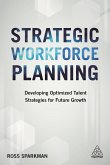Eric Barends, Denise M Rousseau
Evidence-Based Management
How to Use Evidence to Make Better Organizational Decisions
Eric Barends, Denise M Rousseau
Evidence-Based Management
How to Use Evidence to Make Better Organizational Decisions
- Gebundenes Buch
- Merkliste
- Auf die Merkliste
- Bewerten Bewerten
- Teilen
- Produkt teilen
- Produkterinnerung
- Produkterinnerung
Make better organizational decisions using data and evidence from sources both inside and outside your business
Andere Kunden interessierten sich auch für
![Fooled by Randomness Fooled by Randomness]() Nassim Nicholas TalebFooled by Randomness9,99 €
Nassim Nicholas TalebFooled by Randomness9,99 €![Data and Analytics Strategy for Business Data and Analytics Strategy for Business]() Simon Asplen-TaylorData and Analytics Strategy for Business27,99 €
Simon Asplen-TaylorData and Analytics Strategy for Business27,99 €![Digital Darwinism Digital Darwinism]() Tom GoodwinDigital Darwinism70,99 €
Tom GoodwinDigital Darwinism70,99 €![Value-Driven Data Value-Driven Data]() Edosa OdaroValue-Driven Data130,99 €
Edosa OdaroValue-Driven Data130,99 €![Data and Analytics Strategy for Business Data and Analytics Strategy for Business]() Simon Asplen-TaylorData and Analytics Strategy for Business129,99 €
Simon Asplen-TaylorData and Analytics Strategy for Business129,99 €![The 30 Day MBA The 30 Day MBA]() Colin BarrowThe 30 Day MBA54,99 €
Colin BarrowThe 30 Day MBA54,99 €![Strategic Workforce Planning Strategic Workforce Planning]() Ross SparkmanStrategic Workforce Planning114,99 €
Ross SparkmanStrategic Workforce Planning114,99 €-
-
-
Make better organizational decisions using data and evidence from sources both inside and outside your business
Hinweis: Dieser Artikel kann nur an eine deutsche Lieferadresse ausgeliefert werden.
Hinweis: Dieser Artikel kann nur an eine deutsche Lieferadresse ausgeliefert werden.
Produktdetails
- Produktdetails
- Verlag: Kogan Page
- Seitenzahl: 392
- Erscheinungstermin: 26. Januar 2021
- Englisch
- Abmessung: 234mm x 156mm x 30mm
- Gewicht: 726g
- ISBN-13: 9781398693425
- ISBN-10: 1398693421
- Artikelnr.: 60323019
- Herstellerkennzeichnung
- Libri GmbH
- Europaallee 1
- 36244 Bad Hersfeld
- gpsr@libri.de
- Verlag: Kogan Page
- Seitenzahl: 392
- Erscheinungstermin: 26. Januar 2021
- Englisch
- Abmessung: 234mm x 156mm x 30mm
- Gewicht: 726g
- ISBN-13: 9781398693425
- ISBN-10: 1398693421
- Artikelnr.: 60323019
- Herstellerkennzeichnung
- Libri GmbH
- Europaallee 1
- 36244 Bad Hersfeld
- gpsr@libri.de
Eric Barends is Managing Director of the Center for Evidence-Based Management and advises management teams and boards of directors on evidence-based management and decision-making. He is also a visiting lecturer at New York University, Australian National University and VU University Amsterdam. Denise M Rousseau is the H J Heinz II University Professor of Organizational Behavior and Public Policy at Carnegie Mellon University's Heinz College and Tepper School of Business. She was formerly the President of the Academy of Management and is an adviser to numerous social enterprises, professional associations, and governmental and for-profit organizations.
Chapter
01: Evidence
based management: the basic principles (with Rob Briner); Chapter
02: ASK: Critical questions about assumed problems and preferred solutions; Section
PART ONE: Evidence from practitioners; Chapter
03: ACQUIRE: Evidence from practitioners; Chapter
04: APPRAISE: Evidence from practitioners; Section
PART TWO: Evidence from the scientific literature; Chapter
05: A short introduction to science (with Rob Briner); Chapter
06: ACQUIRE: Evidence from the scientific literature; Chapter
07: APPRAISE: Evidence from the scientific literature (with Rob Briner); Section
PART THREE: Evidence from the organization; Chapter
08: ACQUIRE: Evidence from the organization (with Martin Walker); Chapter
09: APPRAISE: Evidence from the organization (with Martin Walker); Section
PART FOUR: Evidence from stakeholders; Chapter
10: ACQUIRE: Evidence from stakeholders; Chapter
11 APPRAISE: Evidence from stakeholders; Chapter
12: AGGREGATE: Weighing and pulling together the evidence; Chapter
13: APPLY: Incorporating the evidence into the decision
making process (with Alessandra Capezio); Chapter
14: ASSESS: Evaluate the outcome of the decision taken; Chapter
15: Building the capacity for evidence
based management; Chapter
16: Guidelines for critically appraised topics;
01: Evidence
based management: the basic principles (with Rob Briner); Chapter
02: ASK: Critical questions about assumed problems and preferred solutions; Section
PART ONE: Evidence from practitioners; Chapter
03: ACQUIRE: Evidence from practitioners; Chapter
04: APPRAISE: Evidence from practitioners; Section
PART TWO: Evidence from the scientific literature; Chapter
05: A short introduction to science (with Rob Briner); Chapter
06: ACQUIRE: Evidence from the scientific literature; Chapter
07: APPRAISE: Evidence from the scientific literature (with Rob Briner); Section
PART THREE: Evidence from the organization; Chapter
08: ACQUIRE: Evidence from the organization (with Martin Walker); Chapter
09: APPRAISE: Evidence from the organization (with Martin Walker); Section
PART FOUR: Evidence from stakeholders; Chapter
10: ACQUIRE: Evidence from stakeholders; Chapter
11 APPRAISE: Evidence from stakeholders; Chapter
12: AGGREGATE: Weighing and pulling together the evidence; Chapter
13: APPLY: Incorporating the evidence into the decision
making process (with Alessandra Capezio); Chapter
14: ASSESS: Evaluate the outcome of the decision taken; Chapter
15: Building the capacity for evidence
based management; Chapter
16: Guidelines for critically appraised topics;
Chapter
01: Evidence
based management: the basic principles (with Rob Briner); Chapter
02: ASK: Critical questions about assumed problems and preferred solutions; Section
PART ONE: Evidence from practitioners; Chapter
03: ACQUIRE: Evidence from practitioners; Chapter
04: APPRAISE: Evidence from practitioners; Section
PART TWO: Evidence from the scientific literature; Chapter
05: A short introduction to science (with Rob Briner); Chapter
06: ACQUIRE: Evidence from the scientific literature; Chapter
07: APPRAISE: Evidence from the scientific literature (with Rob Briner); Section
PART THREE: Evidence from the organization; Chapter
08: ACQUIRE: Evidence from the organization (with Martin Walker); Chapter
09: APPRAISE: Evidence from the organization (with Martin Walker); Section
PART FOUR: Evidence from stakeholders; Chapter
10: ACQUIRE: Evidence from stakeholders; Chapter
11 APPRAISE: Evidence from stakeholders; Chapter
12: AGGREGATE: Weighing and pulling together the evidence; Chapter
13: APPLY: Incorporating the evidence into the decision
making process (with Alessandra Capezio); Chapter
14: ASSESS: Evaluate the outcome of the decision taken; Chapter
15: Building the capacity for evidence
based management; Chapter
16: Guidelines for critically appraised topics;
01: Evidence
based management: the basic principles (with Rob Briner); Chapter
02: ASK: Critical questions about assumed problems and preferred solutions; Section
PART ONE: Evidence from practitioners; Chapter
03: ACQUIRE: Evidence from practitioners; Chapter
04: APPRAISE: Evidence from practitioners; Section
PART TWO: Evidence from the scientific literature; Chapter
05: A short introduction to science (with Rob Briner); Chapter
06: ACQUIRE: Evidence from the scientific literature; Chapter
07: APPRAISE: Evidence from the scientific literature (with Rob Briner); Section
PART THREE: Evidence from the organization; Chapter
08: ACQUIRE: Evidence from the organization (with Martin Walker); Chapter
09: APPRAISE: Evidence from the organization (with Martin Walker); Section
PART FOUR: Evidence from stakeholders; Chapter
10: ACQUIRE: Evidence from stakeholders; Chapter
11 APPRAISE: Evidence from stakeholders; Chapter
12: AGGREGATE: Weighing and pulling together the evidence; Chapter
13: APPLY: Incorporating the evidence into the decision
making process (with Alessandra Capezio); Chapter
14: ASSESS: Evaluate the outcome of the decision taken; Chapter
15: Building the capacity for evidence
based management; Chapter
16: Guidelines for critically appraised topics;

